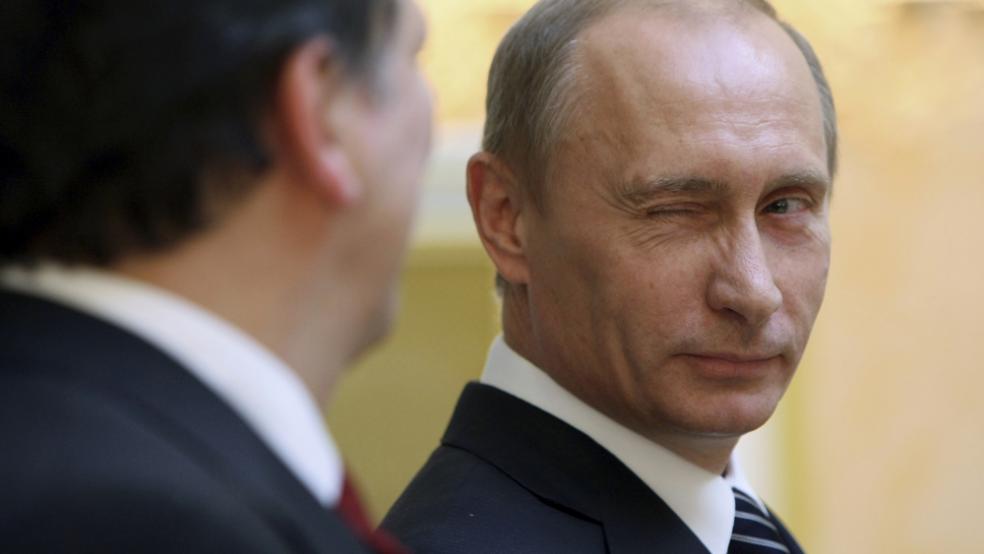Russia's troops are conducting emergency military exercises as its jets patrol its borders. An Eastern European country is in chaos over an internal split about whether the country should be aligned with Europe or Moscow. A deposed and friendless leader is swept away by helicopter under Russian protection. Western military chiefs meet in Brussels to try to come up with a response to keep a fragile peace while limiting Russia’s influence.
This could be the plot of a Tom Clancy Cold War thriller. They are the latest events in the international standoff over Ukraine.
Related: Russian Ties to Ukraine Go Much Deeper than Gas
After President Viktor Yanukovych was escorted to a safe house outside of Moscow Thursday - "I have to ask Russia to ensure my personal safety from extremists," he said, according to Russian news agencies - Ukraine's parliament then approved Arseniy Yatsenyuk as the interim leader of the country. But few eyes are turning to Kiev to predict what happens next.
Nearly all eyes are on Russia and its president, Vladimir Putin. Perhaps emboldened by Russia’s success at Sochi, Putin has made power play after power play to exert his influence over Ukraine.
Since the end of the games, Putin has stayed silent, but his actions speak louder than any words could. He ordered military drills that have raised concerns of invasion. He has flown jets near Russia’s Ukrainian border as a show of force. He’s given Yanukovych cover to get out of the country.
What he’s done that is not known is perhaps more troubling. As a former KGB agent, Putin is well schooled in political provocation and diversion, or seemingly unrelated incidents that are part of a larger, secret strategy. For instance, in Georgia in 2008, Russian spies offered passports to residents of South Ossettia, part of Georgia - then invaded it. They did the same thing in Moldova, with an area of the country called Transnistria.
Related: Ukraine's 'Eastern Spring' Has a Chance to Blossom
Could Putin be doing the same thing in Ukraine? There have been a number of bizarre incidents. For example, why did Yanukovych pull guards from all government buildings when he left Kiev, opening them to looters and the opposition? This could create the appearance of a coup. There have also been a number of incidents where Molotov cocktails have been thrown at synagogues, despite Ukraine not having a history of anti-Semitism.
“In the current political environment, it’s important to ask: Did they come from real anti-Semites? From paid agents? From both?” asked Anne Applebaum, a journalist who specializes in Eastern Europe.
These kinds of provocations could tear Ukraine, which is already bursting at its seams, apart. The southern island of Crimea, which has its own constitution but is technically a part of Ukraine, has been taken over by masked pro-Russian gunmen, who stormed the government building and raised Russian flags.
Oleksandr Turchynov, who stepped in as acting president after Yanukovych left Kiev, called these actions a “crime against the government of Ukraine."
SLIDE SHOW: 35 Intense Photos of the Ukraine Protests
“Unidentified people with automatic weapons, explosives and grenades have taken over the governmental buildings and the Parliament building in the autonomous region of Crimea," he said. "I have given orders to the military to use all methods necessary to protect the citizens, punish the criminals and to free the buildings.
Meanwhile, mainland Ukraine remains polarized, with pro-Europeans in the west and pro-Russians in the east. This, combined with Crimea, raises the prospect of Civil War.
NATO Seemingly Powerless
Despite the dire situation, NATO and the United States appear powerless to stop it. After a meeting with other defense ministers in Brussels, U.S. defense chief Chuck Hagel could only urge Russia not to get involved.
“These are times for cool, wise leadership on Russia's side and everyone's side," Hagel said yesterday. “Until we know more details, what really happened, who's in charge, the focus should be on let's keep the tensions down, let's see no provocative actions by anyone, any military.”
Meanwhile, Secretary of State John Kerry insisted that the Ukraine crisis was not a Cold War game, despite it having all the trappings of one. “This is not ‘Rocky IV.’ It is not a zero-sum game,” Kerry said during a roundtable with reporters.
“We do not view it through the lens of East-West or Russia-the U.S. or anything else. We view it as an example of people within a sovereign nation who are expressing their desire to choose their future.”
Top Reads from the Fiscal Times:





